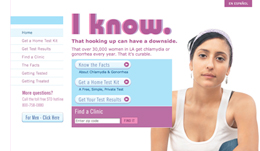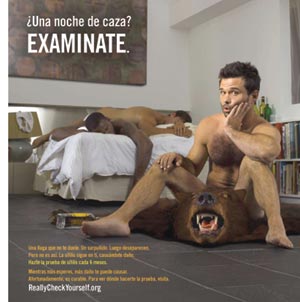Thanks for not sharing
October 15, 2009
Jorge Montoya knew he was no longer in the private sector, brainstorming marketing strategies with the likes of Fox, Paramount and Yahoo.
Hired in 2002 by L.A. County’s Public Health Department to help run its sexually transmitted diseases program, Montoya says he found himself surrounded by nurses and doctors who looked at him “like a crazy man” as he preached the gospel of product branding, social marketing and behavioral research.
Montoya says his new government colleagues simply hadn’t been exposed to the kind of cutting-edge techniques that the county would need to crash through the media clutter and reach its targeted audiences.
“We’ve come along way,” he says. “There’s been a lot of learning.”
Today, those seemingly exotic marketing methods infuse every aspect of the county’s multi-faceted campaign to reduce the region’s high rate of STDs, especially among the high-risk populations of gay men and young women of color. By all accounts, the county’s effort has emerged as one of most innovative and far-reaching in the nation.
 The newest addition to the campaign— www. dontthinkknow.org, a website where women can confidentially order home test kits for chlamydia and gonorrhea—already is producing promising results, potentially saving women from infertility and other long term health affects associated with untreated STDs.
The newest addition to the campaign— www. dontthinkknow.org, a website where women can confidentially order home test kits for chlamydia and gonorrhea—already is producing promising results, potentially saving women from infertility and other long term health affects associated with untreated STDs.
In the first three months after the site’s June launch, nearly 2,000 kits were requested, with about half of them returned to the county for testing. Of those, health officials say, about nine percent came back positive for chlamydia and/or gonorrhea. Nearly 90 percent of the infected women, Montoya says, have sought treatment—a good number, he says, but not good enough. “We want 100 percent and we won’t rest until we get there,” he vows.
Under the direction of the Board of Supervisors, the Public Health Department revamped and intensified its STD prevention program in late 2006, as infections in the county ranked among the highest in the U.S. Particularly alarming was the fact that syphilis, after leveling off for several years, had started soaring again.
Dr. Peter Kerndt, director of public health’s STD program and Montoya’s boss, says that the success of HIV medications had brought an unintended consequence. “There were a whole lot of gay men who were feeling good and they returned to some of the same old risky behaviors,” Kerndt says. “They were getting syphilis and gonorrhea and chlamydia and infecting others.”
This was especially worrisome, he says, because those infected with syphilis are up to five times more likely to pass the HIV virus to partners.
To turn the tide, two distinct campaigns were created through a contract with Fraser Communications, a Los Angeles advertising and marketing firm that handles a mix of public and private sector clients.
 One campaign, called “I Know,” is targeted at young black and Latina women, who have disproportionately high rates of chlamydia and gonorrhea. The other, dubbed “Check Yourself,” urges gay and bisexual men to get tested for syphilis. In both cases, the idea behind the marketing strategy was to create a sense among the targeted audiences that “whoever is talking to me understands my emotions and my drives,” according to Fraser account director Dean Stephens.
One campaign, called “I Know,” is targeted at young black and Latina women, who have disproportionately high rates of chlamydia and gonorrhea. The other, dubbed “Check Yourself,” urges gay and bisexual men to get tested for syphilis. In both cases, the idea behind the marketing strategy was to create a sense among the targeted audiences that “whoever is talking to me understands my emotions and my drives,” according to Fraser account director Dean Stephens.
Supervisor Zev Yaroslavsky provided a crucial infusion of $700,000 from Third District funds to underwrite the inaugural media efforts of the two campaigns. He would later provide an equal amount for both the second and third years.
Among other things, the money paid for a social marketing campaign that has included ads in magazines and on billboards, bus shelters and niche websites. Tens of thousands of posters and postcards have been placed in South L.A. hair and nail salons as part of the “I Know” campaign. The “Check Yourself” effort has included advertising slides in movie theaters and the distribution of more than 100,000 coffee cup sleeves and 76,000 bar coasters in West Hollywood and other targeted neighborhoods.
Outreach teams, meanwhile, have taken to the streets in communities with the highest infection rates, handing out thousands of “palm cards,” as well as lip balm and condom key chains paid for by the non-profit California Family Health Council.
As a result, Montoya says, there has been a “significant association” between women who’ve been exposed to the “I Know” campaign and those who’ve sought testing and treatment. As for the men, they’re more problematic. “They’re easier to reach,” Montoya says, “but harder to motivate.”
Gay men have been bombarded with so many health messages for so long that they’ve become fatigued and desensitized to them, he says.
 So the county’s approach for the “Check Yourself” campaign was to come up with clever, provocative images with new kinds of messages to hopefully inspire men to act. As Fraser account director Stephens put it: “We purposely decided we would not be shy. You can’t deny that people do respond to sexually charged ads.”
So the county’s approach for the “Check Yourself” campaign was to come up with clever, provocative images with new kinds of messages to hopefully inspire men to act. As Fraser account director Stephens put it: “We purposely decided we would not be shy. You can’t deny that people do respond to sexually charged ads.”
The latest round of print ads, which were tested with focus groups, are certainly risqué by government norms. They show men, barely covered, in a series of witty morning-after scenarios, including one in which a man is wearing only an inflatable rubber duck around his hips as he tip-toes across a pool deck. In the background, several nude men are sleepily sprawled across lounges. The headline: “Check Yourself: You can’t escape the night before.”
Fraser’s research shows that, despite an extremely competitive landscape, the ads have grabbed the attention of more than 80 percent of gay men surveyed by the firm. Fraser and the county are now evaluating whether that awareness has translated into more tests.
“Can we change behavior?” asks Montoya. “That’s the challenge.”


















 405 bridge work causes a stink
405 bridge work causes a stink
